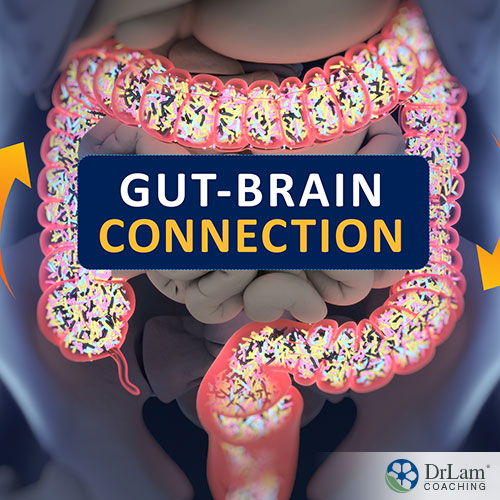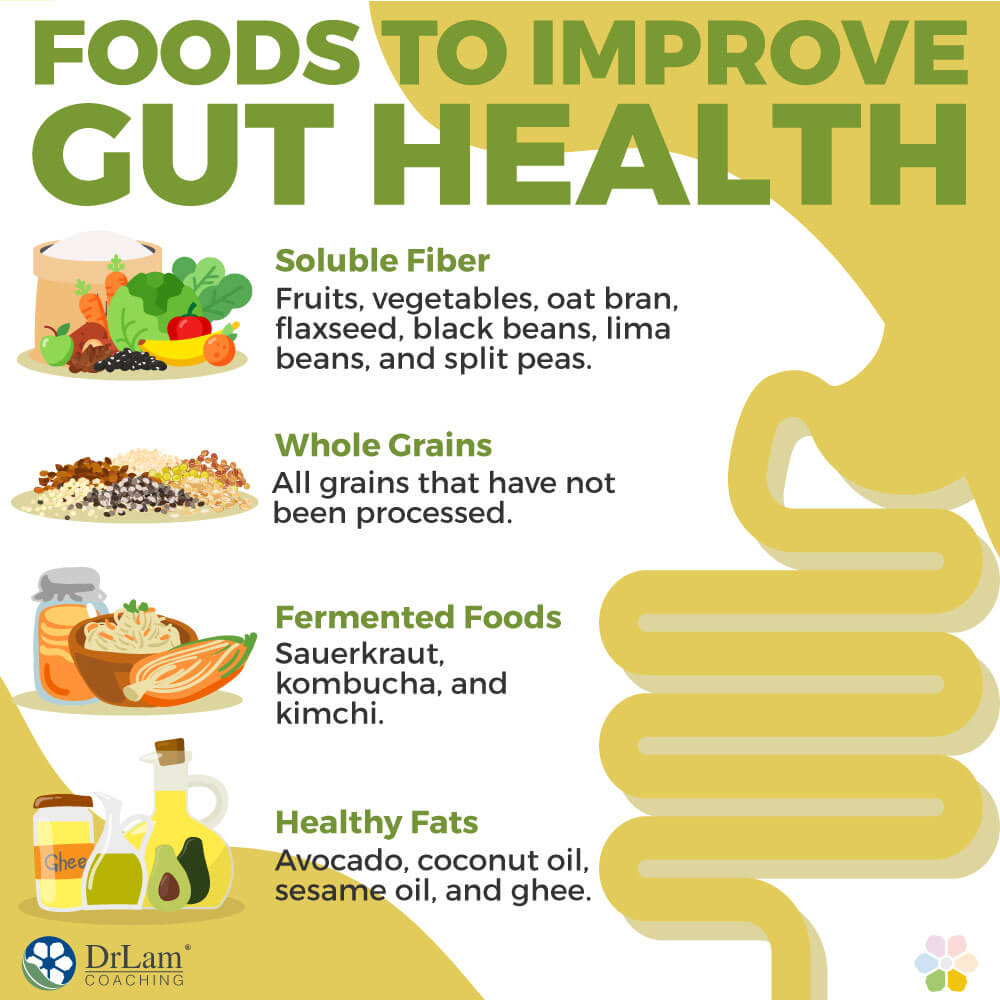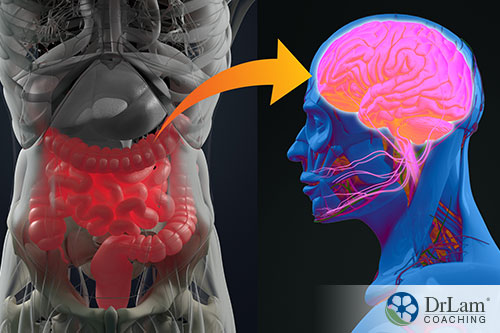It may seem far fetched that stress, anxiety and gut health are related. Knowledge concerning how the brain and gut interact has significantly increased. Good gut health results in good brain health through the gut-brain axis. Recent studies have also investigated methods to improve gut health. These studies used either probiotics or non-probiotic foods and supplements to investigate the link between anxiety and gut health. We will explore all of these connections in this article.
Studies indicate that our diets affect our gut health. The results show that non-probiotic foods and supplements are more effective in improving both anxiety and gut health. So, it’s not just about simply adding some types of bacteria through probiotic supplements. So, it appears that improving your diet has more impact on good gut health.
Let’s explore the linkages across the microbiome, anxiety and your healthy gut.
 The human microbiome contains trillions of cells, most of which are bacteria primarily found in the gut. The diversity of these bacteria, when in balance, keeps your body healthy. These bacteria carry out several functions include helping with the absorption of nutrients and vitamins and producing the majority of certain neurotransmitters, including those related to mental health.
The human microbiome contains trillions of cells, most of which are bacteria primarily found in the gut. The diversity of these bacteria, when in balance, keeps your body healthy. These bacteria carry out several functions include helping with the absorption of nutrients and vitamins and producing the majority of certain neurotransmitters, including those related to mental health.
Unfortunately, the balance of bacteria in your gut can be negatively affected by several factors such as stress. The term dysbiosis describes any change from the normal balance of bacteria in your gut. This state of dysbiosis can come from several sources. These include alcohol consumption, chronic stress, overgrowth of yeasts and bacteria, and environmental toxins.
One of the adverse effects of dysbiosis is called ‘leaky gut’. This condition occurs when the normally tight junctions between epithelial cells lining the gut become loose. This allows undigested food particles, bacteria, and pathogens to gain access to your bloodstream. The result is a triggering of your immune system to fight against these invaders. This also harms your anxiety and gut health.
Another result of leaky gut is an overload of toxins in your brain. These toxins originate in the gut, cross the leaky gut barrier, and travel to your brain through your bloodstream. The result of this toxic overload is increased depression and anxiety, and other mental health issues. This is another indication of the connection between anxiety and gut health.
Oxidative stress is another potential result of gut dysbiosis. Your brain is very sensitive to the effects of oxidative stress. While there’s no verified causative role for oxidative stress in mental health issues, there’s a logical connection. This shows another reason to understand the relationship between mental health issues like anxiety and gut health.
Oxidative stress comes from an excess of free radicals in your body. Normally, these free radicals would be removed through your liver’s detoxification processes. However, when you have gut dysbiosis, the enzymes required for detox are fewer, thus hampering your body’s efforts to get rid of the free radicals.
Another strong indicator of a relationship between anxiety and gut health is inflammation. Gut dysbiosis increases inflammation in your body. This inflammation travels to your brain, where it has negative effects. Depression and anxiety are often complementary, thus inflammation will also increase your anxiety.
There’s a complex interaction between your brain and your gut. This is a bidirectional interaction, such that what affects your gut will also affect your brain and vice-versa.
Three pathways exist that show this interaction. One of the direct pathways between your brain and gut is via the vagus nerve and a number of nerves that are present in your gut and work to transfer signals to your brain. Another pathway is through primed immune cells produced in your gut and transferred to your brain through circulation. The third pathway of interaction is by way of metabolite molecules produced in your gut that travel to your brain and cause changes in behavior. Research has shown that these metabolites produce anxiety and even autistic behaviors in mice when injected into them.
A complex connection between the Neuroaffect Circuit of the NEM stress response, your brain, the presence of anxiety and gut health can be seen in these microbial molecules. There is also evidence of the importance of the connection between your gut and your brain in the way anxiety affects two gastrointestinal disorders (irritable bowel syndrome and inflammatory bowel disorder).
The Neuroaffect Circuit of the NeuroEndoMetabolic (NEM) stress response consists of the brain, autonomic nervous system, and the microbiome. It is not neuropsychiatric but it describes the biological aspects of mental health issues.
As mentioned earlier in this article, your gut affects your brain via the vagus nerve and other pathways. This ensures that whatever happens in your gut will eventually make its way to the brain and affect your behavior. Any dysbiosis in your gut will generate mental health issues such as depression and anxiety. Thus, anxiety and gut health are closely interconnected.
 Stress affects the Neuroaffect Circuit through its effect on your brain and the autonomic nervous system (ANS). Stress leads to increases in stress-fighting hormones. When your body is under stress, these hormones are at an abnormally high level. This affects the centers of your brain that are responsible for regulating emotional responses and cognitive abilities. Inaccurate and possibly distorted perceptions can result and lead to inappropriate emotional responses.
Stress affects the Neuroaffect Circuit through its effect on your brain and the autonomic nervous system (ANS). Stress leads to increases in stress-fighting hormones. When your body is under stress, these hormones are at an abnormally high level. This affects the centers of your brain that are responsible for regulating emotional responses and cognitive abilities. Inaccurate and possibly distorted perceptions can result and lead to inappropriate emotional responses.
Stress also leads to the activation of your ANS, which results in your body entering a “flight-or-fight” mode. As stress persists, it becomes chronic. So, your ANS continues to release neurotransmitters/hormones that keep your body in this highly activated state. The activation can be mistaken for anxiety by your brain. Therefore, the Neuroaffect Circuit can become dysfunctional due to prolonged activation. If this occurs, one of the most common results is anxiety.
One of the ways this anxiety can affect those with adrenal fatigue is through them developing the dysfunctional belief that they will never recover. This belief originates because of the long road to recovery from this condition.
In the adrenal fatigue framework, anxiety is closely related to the large amounts of norepinephrine and epinephrine released with chronic stress. This type of stress overstimulates a part of the ANS called the sympathoadrenal system (SAS), causing the release of too much of these biochemicals. Much of this activation begins with dysbiosis of your gut and the resulting decrease in gut health.

There are several things you can do to directly improve your anxiety and gut health. It is a well-known fact that making changes in your diet is the most effective path to recovery.
One of the best things you can do to improve gut health is to eat more soluble fiber. Increasing your intake of soluble fiber will supply your gut microbes with their favorite food.
Your best source of these soluble fibers is fruits and vegetables. The fibers found here are called oligosaccharides and dissolve in water, making them available for bacteria to break down. An increase in these fibers will also lead to a reduction in inflammation and endotoxins.
Oat bran, flaxseed, black beans, lima beans, and split peas are good sources of this fiber.
Some risks of consuming additional fiber include the potential for dehydration, indigestion, and malabsorption of some minerals and medications.
These include all of the grains that have not been processed. In general, the more processed a grain is, the easier it is to digest. This means it gets digested early in the intestinal tract and doesn’t reach the microbiome. But, exercise caution when increasing your consumption of whole grains. Be sure to get enough folic acid.
Fermented foods contain high levels of good bacteria for your gut health. These can include sauerkraut, kombucha, and kimchi.
But, you must be sure the fermented foods you eat are of a high quality and are safe foods.
Unsaturated plant-based fats are what you want to add to your diet. These include avocado, coconut oil, sesame oil, and ghee, among others. Please be sure that the fats you eat are unsaturated for your heart and overall health.
 There is a connection between anxiety and gut health. Stress is one of the culprits that reduce your gut health. The increased levels of stress-fighting hormones affect areas of your brain that regulate emotional responses and cognitive abilities. This often leads to increased depression and anxiety.
There is a connection between anxiety and gut health. Stress is one of the culprits that reduce your gut health. The increased levels of stress-fighting hormones affect areas of your brain that regulate emotional responses and cognitive abilities. This often leads to increased depression and anxiety.
For people suffering from adrenal fatigue, anxiety is a prevalent issue. These people tend to develop health anxiety, which stems from the mistaken belief that they will never get better.
The more healthy your gut is, the less chance you have of developing anxiety or other health issues. Therefore, you should do all that you can to improve your gut health, as you will also improve your mental health.
© Copyright 2021 Michael Lam, M.D. All Rights Reserved.
Recent research shows the relationship between anxiety and gut health to be complex. Stress and the body’s reaction to it is the foundation. Stress brings on both anxiety and problems with gut health. Poor gut health leads to increased anxiety. Anxiety is a stressor triggering the body’s response again.
